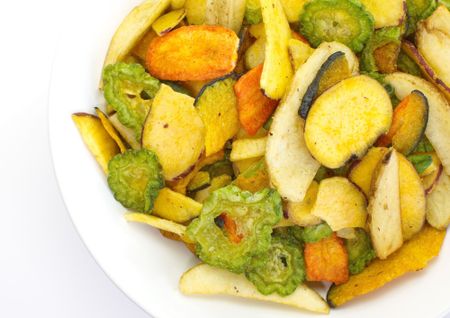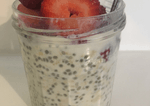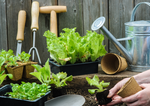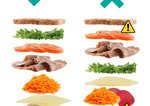Pass the salt on the vegie chips
by Guest Author,
- December 8, 2021
- Leave a comment
- Marketing
- Healthy eating
- Mythbusting
- Fruit and Vegetables
- Industry
- Junk Food
- Research
- Snacks
- Nutrition Facts

by Tammara Olds, Student Nutritionist at Deakin University (2021)
If you’ve been in a supermarket lately and happened to walk down the “health food” aisle, you may have noticed an explosion in the number of chip alternatives on offer. Gone are the days of choosing between potato or corn, you can now find chips made from a whole range of different vegetables like lentils, peas, mushroom, carrot, broccoli, beetroot and seaweed.
Vegie chips often have enticing labels promising a healthier alternative to your standard crinkle cut.
But are they really healthier?
To find out, we decided to look beyond the pretty packaging to work out what’s really in your chips.
We conducted a nutrition audit of the vegie chips available from the health food and chip aisles at Australia’s two major supermarket chains. Products that only contained potato or corn were excluded from the analysis; we wanted to focus on the new wave of alternative chips that have hit the supermarket shelves over the last few years.
What we found
We rounded up 84 different vegie chip products to include in our analysis. Of these, more than two-thirds (69%) contained unacceptable levels of salt, defined as over 400mg of sodium per 100g of product. Shockingly, 14 of the vegie chip products contained over 1000mg of sodium per 100g!
The worst offenders with over 1000mg sodium per 100g
Product |
Flavour |
Sodium (mg) per 100g |
|
Ceres Organic Seaweed Snacks |
Original |
2300 |
|
Simply 7 Lentil Chips |
Sea Salt |
1648 |
|
The Natural Chip Co Lentil Craves |
Sweet Chili Sour Cream |
1420 |
|
Ceres Organic Seaweed Snacks |
Chilli |
1355 |
|
Ajitas Vege Twists with Potato & Lentils |
Cheese |
1317 |
|
Ajitas Vege Chips |
Salt & Vinegar |
1230 |
|
Ajitas Vege Rice Crackers |
Honey Soy |
1200 |
|
Simply 7 Lentil Chips |
Honey Soy Chicken |
1160 |
|
Simply 7 Lentil Chips |
Jalapeno |
1070 |
|
Ajitas Vege Deli Crisps |
Turmeric and Cheese |
1050 |
|
Ajitas Vege Chips |
Chicken |
1030 |
|
OBAP Seaweed Snacks |
Roasted |
1020 |
|
Honest Sea Roasted Seaweed Snack |
Teriyaki |
1013 |
|
Simply 7 Lentil Chips |
Sea Salt & Balsamic Vinegar |
1010 |
How much salt is too much?
The World Health Organization recommends a salt intake of less than 5g per day (about 2000mg of sodium), but with so much hidden salt in processed food, it can be hard to identify how much you’re eating. The LiveLighter Wallet Card includes an easy guide to help you assess the amount of salt in packaged foods. Any products containing more than 400mg sodium per 100g are considered to be high in salt, and are best eaten only occasionally and in small quantities.
Beyond salt
While high salt content was a concern across most of the vegie chips included in our analysis, there were a few products that also stood out because of their high sugar and saturated fat content.
Four products were over 20% sugar, with one of these even containing almost double this to sit at a whopping 40% sugar. Added sugar was found in each of the four products, contributing to the unexpectedly high figures. Hidden sugar was also found in other vegie chips included in the study, and was listed in the ingredients under a variety of names including molasses, dextrose, cane sugar, dextrin, honey powder, icing sugar, sugar and maltodextrin.
Product |
Sugar (g) per 100g |
|
DJ&A Broccoli Florets |
39.7 |
|
DJ&A Veggie Crisps |
30.5 |
|
DJ&A Shiitake Mushroom Chips |
27 |
|
Coles Veggie Chips (scoop and weigh) |
23 |
The saturated fat content was an issue for one brand of crispy seaweed snacks due to the addition of palm oil to their products. Unlike most plant oils, palm oil is high in saturated fat, a type of fat that experts recommend we don’t have too much of for heart health. Unless it’s sustainability sourced, the production of palm oil has also been linked to considerable environmental damage, particularly deforestation and the destruction of habitat for endangered species.
Product |
Flavour |
Saturated fat (g) per 100g |
|
Taokaenoi Crispy Seaweed |
Original |
27.6 |
|
Taokaenoi Crispy Seaweed |
Hot & spicy |
26.9 |
|
Taokaenoi Crispy Seaweed |
Sour cream and chives |
24.7 |
The take home message…
While vegie chips might be marketed as a crispy alternative to vegetables, these products are not a good replacement for eating five serves of vegetables each day. Not only are most vegie chips high in salt, they’re also ultra processed, and don’t contain anywhere near as much of the good stuff like vitamins and phytonutrients that you get from the real thing. With the amount of sodium present, your heart will also thank you if you walk right by the chip aisle. If you do decide to pick up a packet, look for products with less than 400mg per 100g, and try to avoid eating the whole bag!
For a healthier crispy vegie snack, try cutting up fresh vegetables and eating them with dips such as hummus, walnut dip or easy tzatziki.







